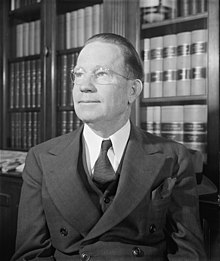William M. Colmer: Difference between revisions
mNo edit summary |
Changed wikilink; ce |
||
| Line 30: | Line 30: | ||
In 1932, Colmer was elected to the [[United States House of Representatives|House of Representatives]] as a [[Democratic Party (United States)|Democrat]] from Mississippi's 6th District, located on the Gulf Coast. He was reelected 19 times. His district was renumbered the 5th after the 1960 Census, when Mississippi's declining population cost it a congressional seat. |
In 1932, Colmer was elected to the [[United States House of Representatives|House of Representatives]] as a [[Democratic Party (United States)|Democrat]] from Mississippi's 6th District, located on the Gulf Coast. He was reelected 19 times. His district was renumbered the 5th after the 1960 Census, when Mississippi's declining population cost it a congressional seat. |
||
Originally elected as a supporter of President [[Franklin D. Roosevelt]]'s [[New Deal]], Colmer became increasingly conservative as the years passed. He became disenchanted as the national Democratic Party began to support the [[ |
Originally elected as a supporter of President [[Franklin D. Roosevelt]]'s [[New Deal]], Colmer became increasingly conservative as the years passed. He became disenchanted as the national Democratic Party began to support the [[Civil Rights Movement]]. After the ''[[Brown v. Board of Education]]'' (1954) decision by the [[United States Supreme Court]], ruling that public school segregation was unconstitutional, Colmer helped to get Southern Democratic congressmen to sign the "[[The Southern Manifesto|Southern Manifesto]]" declaring their resistance. |
||
Colmer endorsed the [[Republican Party (United States)|Republican Party]] candidates [[Richard Nixon]] for [[President of the United States|president]] in 1960, 1968 and 1972, and [[Barry Goldwater]] in 1964. Because of his seniority, he advanced to the position as chairman of the [[U.S. House Committee on Rules|Rules Committee]], serving from 1967 to 1973. |
Colmer endorsed the [[Republican Party (United States)|Republican Party]] candidates [[Richard Nixon]] for [[President of the United States|president]] in 1960, 1968 and 1972, and [[Barry Goldwater]] in 1964. Because of his seniority, he advanced to the position as chairman of the [[U.S. House Committee on Rules|Rules Committee]], serving from 1967 to 1973. |
||
Revision as of 18:04, 9 December 2016
William M. Colmer | |
|---|---|
 | |
| Member of the U.S. House of Representatives from Mississippi | |
| In office January 3, 1933 – January 3, 1973 | |
| Preceded by | Robert S. Hall |
| Succeeded by | Trent Lott |
| Constituency | 6th district (1933–63) 5th district (1963–73) |
| Chairman of the House Rules Committee | |
| In office January 3, 1967 – January 3, 1973 | |
| Preceded by | Howard W. Smith |
| Succeeded by | Ray Madden |
| Personal details | |
| Born | William Meyers Colmer February 11, 1890 Moss Point, Mississippi, U.S. |
| Died | September 9, 1980 (aged 90) Pascagoula, Mississippi, U.S. |
| Political party | Democratic |
| Alma mater | Millsaps College |
William Meyers Colmer (February 11, 1890 – September 9, 1980) was a Mississippi politician.
Colmer was born in Moss Point, Mississippi, and attended Millsaps College. He served in the military during World War I.
Colmer was elected Jackson County attorney in 1921, becoming district attorney in 1928.
In 1932, Colmer was elected to the House of Representatives as a Democrat from Mississippi's 6th District, located on the Gulf Coast. He was reelected 19 times. His district was renumbered the 5th after the 1960 Census, when Mississippi's declining population cost it a congressional seat.
Originally elected as a supporter of President Franklin D. Roosevelt's New Deal, Colmer became increasingly conservative as the years passed. He became disenchanted as the national Democratic Party began to support the Civil Rights Movement. After the Brown v. Board of Education (1954) decision by the United States Supreme Court, ruling that public school segregation was unconstitutional, Colmer helped to get Southern Democratic congressmen to sign the "Southern Manifesto" declaring their resistance.
Colmer endorsed the Republican Party candidates Richard Nixon for president in 1960, 1968 and 1972, and Barry Goldwater in 1964. Because of his seniority, he advanced to the position as chairman of the Rules Committee, serving from 1967 to 1973.
Colmer did not run for reelection in 1972. He endorsed his administrative assistant, Trent Lott, as his successor, although Lott ran as a Republican. Colmer served longer in either house of Congress than anyone in Mississippi's history except Jamie Whitten, who served 54 years in Congress.
See also
References
- United States Congress. "William M. Colmer (id: C000645)". Biographical Directory of the United States Congress.

